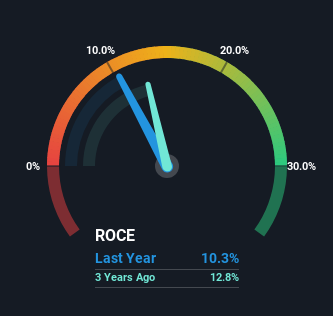There are a few key trends to look for if we want to identify the next multi-bagger. Ideally, a business will show two trends; firstly a growing return on capital employed (ROCE) and secondly, an increasing amount of capital employed. If you see this, it typically means it's a company with a great business model and plenty of profitable reinvestment opportunities. However, after briefly looking over the numbers, we don't think NJS (TSE:2325) has the makings of a multi-bagger going forward, but let's have a look at why that may be.
Return On Capital Employed (ROCE): What Is It?
Just to clarify if you're unsure, ROCE is a metric for evaluating how much pre-tax income (in percentage terms) a company earns on the capital invested in its business. Analysts use this formula to calculate it for NJS:
Return on Capital Employed = Earnings Before Interest and Tax (EBIT) ÷ (Total Assets - Current Liabilities)
0.10 = JP¥2.8b ÷ (JP¥33b - JP¥6.6b) (Based on the trailing twelve months to March 2024).
Thus, NJS has an ROCE of 10%. That's a relatively normal return on capital, and it's around the 9.2% generated by the Commercial Services industry.
See our latest analysis for NJS

Historical performance is a great place to start when researching a stock so above you can see the gauge for NJS' ROCE against it's prior returns. If you'd like to look at how NJS has performed in the past in other metrics, you can view this free graph of NJS' past earnings, revenue and cash flow.
So How Is NJS' ROCE Trending?
In terms of NJS' historical ROCE movements, the trend isn't fantastic. To be more specific, ROCE has fallen from 16% over the last five years. However, given capital employed and revenue have both increased it appears that the business is currently pursuing growth, at the consequence of short term returns. And if the increased capital generates additional returns, the business, and thus shareholders, will benefit in the long run.
The Key Takeaway
In summary, despite lower returns in the short term, we're encouraged to see that NJS is reinvesting for growth and has higher sales as a result. And the stock has done incredibly well with a 112% return over the last five years, so long term investors are no doubt ecstatic with that result. So should these growth trends continue, we'd be optimistic on the stock going forward.
On a separate note, we've found 2 warning signs for NJS you'll probably want to know about.
While NJS may not currently earn the highest returns, we've compiled a list of companies that currently earn more than 25% return on equity. Check out this free list here.
Valuation is complex, but we're here to simplify it.
Discover if NJS might be undervalued or overvalued with our detailed analysis, featuring fair value estimates, potential risks, dividends, insider trades, and its financial condition.
Access Free AnalysisHave feedback on this article? Concerned about the content? Get in touch with us directly. Alternatively, email editorial-team (at) simplywallst.com.
This article by Simply Wall St is general in nature. We provide commentary based on historical data and analyst forecasts only using an unbiased methodology and our articles are not intended to be financial advice. It does not constitute a recommendation to buy or sell any stock, and does not take account of your objectives, or your financial situation. We aim to bring you long-term focused analysis driven by fundamental data. Note that our analysis may not factor in the latest price-sensitive company announcements or qualitative material. Simply Wall St has no position in any stocks mentioned.
Have feedback on this article? Concerned about the content? Get in touch with us directly. Alternatively, email editorial-team@simplywallst.com
About TSE:2325
NJS
Primarily engages in water and environmental consulting, digital transformation, and customer services business in Japan and internationally.
Flawless balance sheet average dividend payer.
Market Insights
Community Narratives



